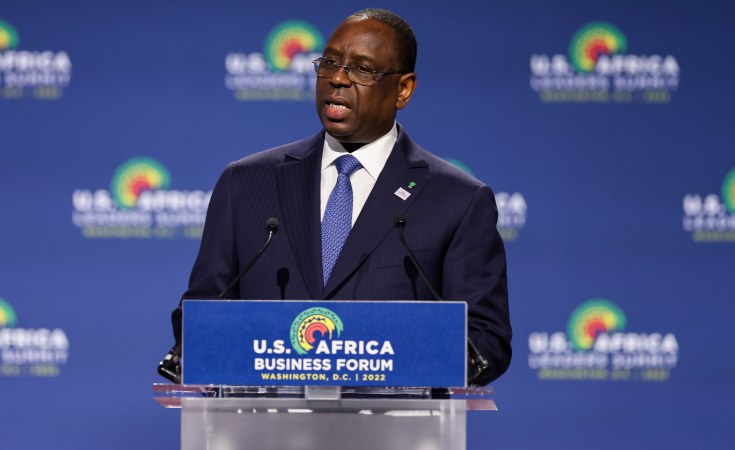When President Macky Sall announced in a televised address Monday that he would not seek a third term, democracy advocates and opposition supporters in the country celebrated.
Senegal's 61-year-old president said the country "is bigger than" he is and is "full of leaders equally capable of pushing the country toward emergence."
Sall's supporters, like Saidibou Sy, a Dakar resident, said the president made the right call. "If he [Sall] had decided to serve a third term, it would have been complicated for the country," he told Reuters.
Violent protests rocked the West African nation for weeks following speculation that the president would seek a third term. Until Monday, Sall refused to confirm or deny whether he intended to seek reelection.
Mucahid Durmaz, a senior analyst at Verisk Maplecroft, a London global risk intelligence company, said increased pressure from the opposition might have been behind the president's decision.
"The opposition bloc has succeeded in utilizing socioeconomic grievances to sustain a nationwide protest movement against Sall's rule," Durmaz told VOA. "The widespread protests convinced Sall that a third term would deepen polarization, undermine the country's democratic credentials and endanger the future of development projects."
Similar decisions 'unlikely'
Despite the positive response to Sall's announcement, Durmaz said it was "unlikely to convince juntas and authoritarian leaders in power across West Africa to follow suit."
Sall was first elected president in 2012 before returning to the presidency seven years later. Actions during his time in power -- jailing opposition figures and removing party officials who challenged his candidacy for a third term -- were seen as an attempt to hold on to power.
But conflict over the extension of term limits on the continent isn't new.
In Tunisia, the country approved a new constitution in 2022 that sealed a one-man rule with President Kais Saied, 65, in a referendum that observers said dealt a blow to democratic efforts. The new constitution removed a provision that had prevented leaders from altering the two-term limit, according to the New York advocacy group Human Rights Watch.
The continent has had its share of long-serving leaders, including Equatorial Guinea's Teodoro Obiang Nguema Mbasogo, Cameroon's Paul Biya, Denis Sassou Nguesso of the Republic of Congo, Uganda's Yoweri Museveni, King Eswatini III of Eswatini and Eritrea's Isaias Afwerki.
Senegal stood out
Political instability, coups and countercoups in countries like Mali, Burkina Faso and Guinea have also derailed democratic processes in the region, observers say. But for a long time, Senegal stood out for its peaceful transition of power.
"Senegal's democratic culture has been entrenched thanks to a well-organized civil society that has protected democratic norms from leaders trying to hold on to power," Durmaz said. "This isn't the case in the likes of Cameroon, Tunisia or Equatorial Guinea as civil society is nonexistent or has been heavily suppressed."
Odeh Friday, Nigeria country director for Accountability Lab, an advocacy group focused on governance, said that the Senegalese president was honoring a "verbal commitment" he made at the second U.S.-organized Summit for Democracy in Washington in March.
"I think Sall's surprising decision could potentially serve as a shining example for other African leaders who face similar questions about their political futures," Friday said.
"It is quite an early decision to make to see what it means for the African continent," Friday said, "and it remains uncertain whether the decision will have a lasting impact on the behavior of other African leaders, even within the region, because the power structures are different and the willingness to uphold term limits may vary."
Democratic possibilities
Friday added that Sall's decision could also show other African leaders that "it is possible to allow democratic principles and processes to run their course.
"The voices of the people in the democratic setting should be the key, and I am very hopeful that Africa will continue to move from where we are to a better place."
As for the future of Senegal in the wake of political changes, Durmaz said former Prime Minister Idrissa Seck could emerge as a viable candidate.
Seck "is likely to present himself as a moderate candidate who can lead a smooth transition into the post-Sall era," he said.
This story originated in VOA's English to Africa Service.


